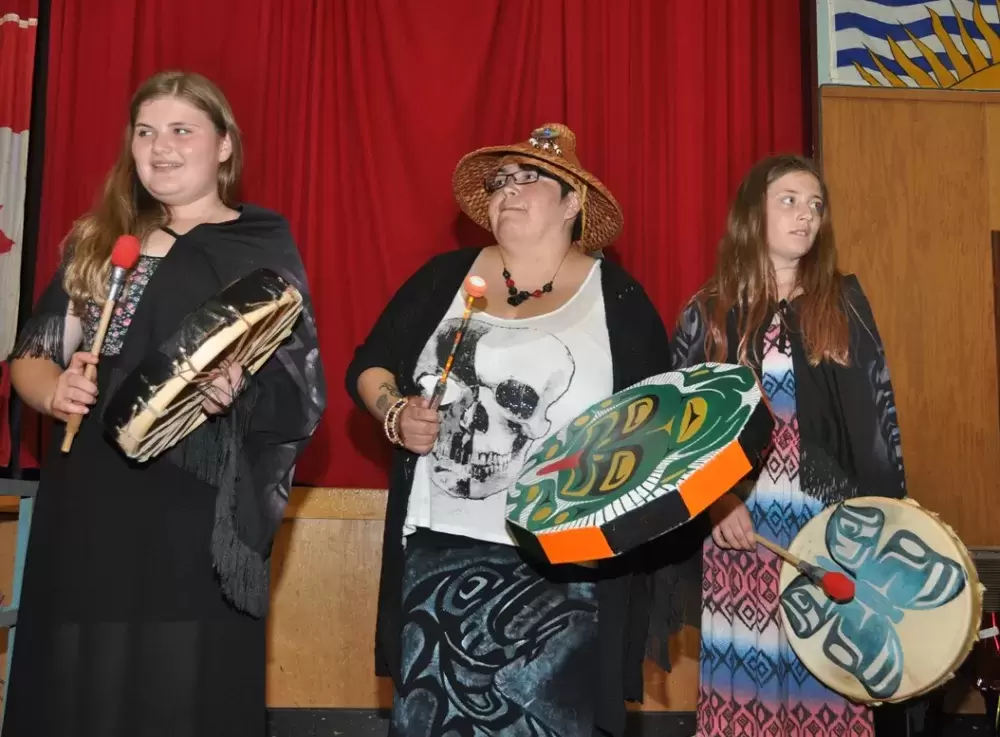Ahousaht member Georgina Sutherland, and by extension, Nuu-chah-nulth culture, took centre stage at the John Howitt Elementary School's year-end assembly on June 23.
Three Howitt students, Payton Lucas of Hesquiaht First Nation, Hayleigh Watts (Tseshaht) and Jaden Warner (Huu-ay-aht), welcomed guests to Nuu-chah-nulth territory.
Emcee Dani McLean introduced Sutherland and her role as Nuu-chah-nulth Education Worker.
“We are very lucky to have had Geena with us,” said School District 70 District Principal Stacey Manson. “We are now going to sing a very special song" (Woman's Honor Song), which is owned by Geena, and composed by her father, Tim, who was in the audience that day.
The Howitt students were assembled in a circle around the audience and, with Sutherland leading, performed a spirited rendition of the song. Many of the girls wore shawls with traditional artwork designed by Sutherland.
“Kleco Kleco to Geena for creating this artwork, and for teaching us [Nuu-chah-nulth] language and culture,” McLean said.
Manson noted that two long-time Howitt teachers, Carla Yochim and Grace Leakey, were retiring at the end of the school year, and the pair received a number of gifts and recognitions as the assembly progressed.
“Geena really wanted to help mark the occasion of Mrs. Leakey’s and Ms. Yochim’s retirement.”
With that, Sutherland presented Leakey with an Eagle drum, while Yochim received a Butterfly drum.
“When you receive a drum, it is a very special honour and a very special gift,” McLean observed.
Ha-Shilth-Sa spoke with Sutherland as the assembly was winding down. She explained that she was called in to fill a vacancy at the school in January. It was her first post, and she was determined to make an impact.
“On a normal school day, I’m the ‘meet-and-greet’ for the children,” she explained. “I am like the transition between home and class time. I find my job important because it helps stabilize the children.”
Sutherland hastened to note that her activities are not limited to Nuu-chah-nulth children; she serves the entire school population in this role.
“The ratio of Indigenous children at Howitt is very low, so it’s ‘Aboriginal education across the whole blackboard,’” she said.
Sutherland said she brought traditional Nuu-chah-nulth activities to the classroom, and those non-Indigenous children have responded enthusiastically.
“I have canned salmon with three of the classes and done Native art with the rest of the classes,” she said.
The salmon was presented to dads on Father’s Day, and the students executed 75 canvasses, 24 inches by 36 inches, for Mother’s Day gifts.
“I designed the two different canvasses myself,” Sutherland said.
The painting was done by the children, with direction from Sutherland. They ranged from Kindergarten, Grade 1/2 and Grade 6.
“Originally, the teachers thought I was crazy to let little kids paint such detailed canvasses. They thought their motor skills wouldn’t be there. We just astonished everybody. It really pushed the children to want to do their best.”
Sutherland said it has been satisfying to encourage non-Indigenous children to identify with Nuu-chah-nulth culture.
“When I first got here there wasn’t a lot of Aboriginal awareness. So I came in with a gentle approach… friendly and kind. The kids didn’t know how to receive me in the beginning, but they were willing to open themselves up to me.”
Sutherland faces a new challenge this fall when she takes over as Nuu-chah-nulth Education Worker at VAST. The VAST program typically serves older students, some adult, who have been unable to succeed in the mainstream system.
The proportion of Nuu-chah-nulth students in the VAST system is much higher than at Howitt. Sutherland believes connecting (or re-connecting) students with Nuu-chah-nulth culture can only have a positive effect.
“When I was very, very young, I went to residential school, with my brothers and sisters. I grew up with my whole family having been in residential school,” she said.
Sutherland said her family made a conscious effort to re-establish the Nuu-chah-nulth family dynamics that the residential school experience stripped away.
“Like the kind, loving gentleness that my Grandpa used to have,” she said. “And to emphasize the importance of education. My grandmother, Evelyn Marshall, wanted her whole family to be educated.”
As a result, Sutherland said the education rate in her own family is high.
Sutherland credited District Principal Manson for much of her success at Howitt.
“She has come to realize the importance of bringing Nuu-chah-nulth culture into the classroom, and she has given me a lot of encouragement along the way.”







